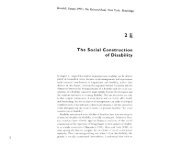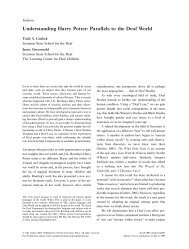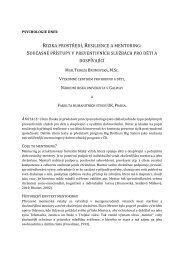Morphogenesis versus Structuration: On Combining ... - Moodle
Morphogenesis versus Structuration: On Combining ... - Moodle
Morphogenesis versus Structuration: On Combining ... - Moodle
Create successful ePaper yourself
Turn your PDF publications into a flip-book with our unique Google optimized e-Paper software.
<strong>Morphogenesis</strong> <strong>versus</strong> structuration 483<br />
or peripheric ones. The same arguments<br />
hold for processes of social change.<br />
'Even if there were no problems of<br />
identifying core elements of a system,<br />
there would still be a problem of<br />
distinguishing basic from superficial<br />
changes. This is important for the<br />
following reason: even if one identifies<br />
factor A as strategic in relation to B, C,<br />
D and E, this does not mean that these<br />
other, non-core features do not change<br />
at all without an initial change in A,<br />
nor does it mean that changes in them<br />
have no effect at all on changes in A<br />
. . . The crucial question is: do changes<br />
in A produce radical changes in B, C,<br />
D or E, while changes in B, C, D and<br />
E produce only superficial changes in<br />
A And if the answer to this question<br />
is affirmative, does one have some<br />
measure for distinguishing radical<br />
changes from superficial ones And, if<br />
one does have such a measure, when<br />
does one apply it For the short-run<br />
effect of B on A might be superficial,<br />
while the long-run effect might be<br />
radical! The gist of all this discussion<br />
is that one can only know ex post<br />
facto whether a particular change was<br />
or was not a change in a acore" feature<br />
of the social structure.' (Modern Social<br />
Theory, op. cit., p. 177 (see 176-8).)<br />
68. E. Gellner, 'Holism vs. Individualism',<br />
op. cit., p. 267.<br />
69. Giddens, Central Problems in<br />
Social Theory, op. cit., p. 106.<br />
70. An ambitious attempt, which<br />
nevertheless manifests this defect, to<br />
unify the concepts used in all the social<br />
sciences by translating them into the<br />
terminology of systems theory is<br />
Alfred Kuhn, The Logic of Social<br />
Systems, Jossey-Bass, San Francisco,<br />
1976.<br />
71. Walter Buckley, Sociology and<br />
Afodern Systems Theory, op. cit.,<br />
p. 206.<br />
72. Giddens, Central Problems in<br />
Social Theory, op. cit., p. 4.<br />
73. Ibid.,p.251.<br />
74. Ibid., p. 18.<br />
75. Ibid., p. 47.<br />
76. Ibid., p. 48.<br />
77. Ernest Gellner, Thought and<br />
Change, Weidenfeld & Nicolson,<br />
London, 1964, pp. 184 ff.<br />
78. Eco cited by Giddens, Cen tral<br />
Problems in Social Theory, op. cit.,<br />
p. 106.<br />
79. Walter Buckley, Sociology and<br />
Modern Systems Theory, op. cit.,<br />
p. 137.












